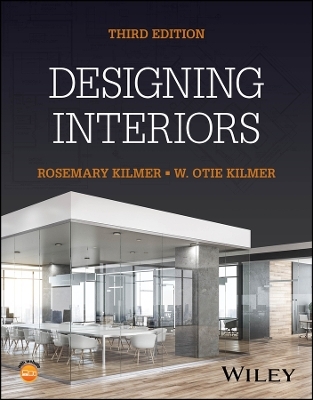
Designing Interiors
John Wiley & Sons Inc (Verlag)
978-1-394-19968-6 (ISBN)
Designing Interiors serves as a comprehensive overview of the basic knowledge required to become a professional interior designer. As the field of interior design evolves, education and practice continue to emphasize solid expertise in designing for people, their environments, and a better quality of life for all. This revised and updated Third Edition ushers in a new era of design for a new generation of interior designer students, with vital information on post pandemic design trends, additional coverage of sustainability, and key issues related to building codes. Design professors Rosemary and Otie Kilmer provide a complete design history that incorporates non-Western design and dynamic color illustrations that flesh out technical concepts.
This third edition of Designing Interiors also includes:
Space planning residential spaces post-pandemic
Expanded sustainability guidance including Green Certification programs; WELL, FITWEL, Energy Star, and more
Updated supplemental instructor resources and activities
New interior photographs illustrating today’s interior design projects
Up to date information on “Interior Design as a Profession” post pandemic
Intended primarily as an introduction to interior design at the college level, Designing Interiors, Third Edition can also be used in subsequent studio courses, and is an ideal resource for working professionals.
Rosemary Kilmer, ASID, IDEC, LEED AP, RID, is Professor Emeritus of Interior Design, Purdue University, West Lafayette, IN. She has served on the board of directors for NCIDQ and is a professional member of ASID and IDEC. She co-authored, with W. Otie Kilmer, Construction Drawings and Details for Interiors: 4th Edition, published by Wiley. W. Otie Kilmer, AIA, is Professor Emeritus of Interior Design, Purdue University, West Lafayette, IN. Otie has taught drawing and design for over thirty years, in addition to practicing architecture and interior design with several internationally known firms. The authors have led their own design practice, Kilmer and Associates.
Preface xviii
Acknowledgments xx
About the Companion Website xxi
Part One: Introduction to the Interior Design Profession and the Historical and Theoretical Basis of Design
Chapter 1 Interior Design: An Introduction 1
Current Issues in Design 1
Historical Overview 5
Interior Design as a Profession 9
Entering The Field of Interior Design 10
Professional Societies 14
Activities 16
Chapter 2 The Origins of Design 17
The Meaning and Essence of Design 18
The Development of Design 22
Design History 24
Non-European Architecture and Interiors 58
Note 66
Activities 66
Chapter 3 The Evolution of Modern Design 67
New Technology and Innovative Design 67
The Twentieth Century 75
Modernism 83
Developments Today and Tomorrow 105
Activities 110
Chapter 4 The Basic Theories of Design Composition 111
Design Approaches 111
The Elements of Design 118
The Principles of Design 139
Activities 148
Chapter 5 Color and Light 149
Light Sources 149
Modifiers of Light 152
Human Vision and Perception 153
Color Theory and Systems 154
Psychology of Color 171
Note 183
Activities 183
Part Two: Planning Residential and Commercial Spaces
Chapter 6 Design as a Process 185
The Design Process: The Sequential Steps 186
Notes 205
Activities 205
Chapter 7 Programming Interior Spaces 207
Values in Programming 209
The Programming Process: The Sequential Steps 210
Notes 225
Activities 225
Chapter 8 Space Planning of Residential Interiors 227
Introduction to Space Planning 227
Planning Residential Spaces 231
Planning Guidelines 232
Space Organization 234
Interior Zoning 237
Special Housing Needs 265
Activities 266
Chapter 9 Space Planning of Commercial Interiors 267
Office Design 267
Financial Institutions 279
Retail Design 282
Hospitality Design 287
Healthcare Design 293
Institutional, Public, Government, and Other Facilities 296
Religious 297
Industrial and Transportation 298
Specialized Interiors 298
Activities 299
Part Three: the Exterior and Interior Environments
Chapter 10 Environmental Concerns, Codes, Regulations, and Sustainability Certifications 301
The Total Environment: Influences on Interiors 301
Sustainability and Green Certification Programs 303
Land Use and Development 305
Form Determinants for Buildings 310
Building Codes 314
Barrier-Free Access 319
Historic Preservation, Restoration, and Adaptive Reuse 322
Activities 325
Chapter 11 Interior Environmental Control and Support Systems 327
Energy Conservation and Climate Control 327
Activities 354
Chapter 12 Lighting for Interiors 355
Natural Light 356
Artificial Light 358
Artificial Light Sources 358
Lighting Needs and Application 368
Lighting Fixtures and Techniques 371
Electrical Controls for Lighting 375
Interior Applications of Lighting 376
Lighting Codes and Regulations 384
Activities 384
Part Four: Interior Materials, Architectural Systems, Finishes, and Components
Chapter 13 Materials—characteristics and Applications 385
Introduction to Selecting Materials 385
Wood 388
Masonry 399
Concrete 407
Ceramics 409
Glass 411
Metals 414
Plastics 417
Textiles 421
Miscellaneous Materials 434
Activities 435
Chapter 14 Architectural Systems and Interior Finishes 437
Sustainable Architecture and Engineering 437
Building Shell and Structural Systems 438
Floor Systems 446
Floor Finishes and Specification Criteria 448
Wall Systems 463
Ceiling Systems 471
Activities 475
Chapter 15 Interior Components 477
Stairs 477
Doors 482
Windows 486
Interior Window Treatments 492
Cabinetry 499
Fireplaces 503
Activities 506
Part Five: Furniture, Furnishings, and Equipment
Chapter 16 Furniture 507
Designing with Furniture 508
Selection Criteria for Furniture 511
Furniture Types 514
Furniture Materials and Construction 533
Activities 538
Chapter 17 Furnishings and Equipment 539
Furnishings 539
Equipment 558
Activities 561
Part Six: Aspects of Professional Practice
Chapter 18 Design Communication 563
Drawing as Design Communication 566
Digital Media for Design Communication 587
Models as Design Communication 588
Materials, Techniques, and Reproduction 592
Oral and Written Communication 592
Digital Technology and Building Information Modeling (BIM) 594
Putting the Presentation Together 596
Activities 596
Chapter 19 The Professional Practice of Interior Design—business And Management 597
Interior Design as a Business 597
Types of Services Offered 598
Business Operations 599
Marketing, Public Relations, Ethics 604
Business Consultants 604
Fees and Compensation 605
Contractual Agreements 606
Bookkeeping and Accounting 608
Project Management 610
Design Teams and Staff Organization 610
The Client’s Budget and Costs 611
Project Scheduling 612
Professionalism and Regulation In Interior Design 623
Activities 623
Glossary 625
Index 637
| Erscheinungsdatum | 10.09.2024 |
|---|---|
| Verlagsort | New York |
| Sprache | englisch |
| Maße | 213 x 274 mm |
| Gewicht | 1769 g |
| Themenwelt | Technik ► Architektur |
| ISBN-10 | 1-394-19968-6 / 1394199686 |
| ISBN-13 | 978-1-394-19968-6 / 9781394199686 |
| Zustand | Neuware |
| Informationen gemäß Produktsicherheitsverordnung (GPSR) | |
| Haben Sie eine Frage zum Produkt? |
aus dem Bereich


